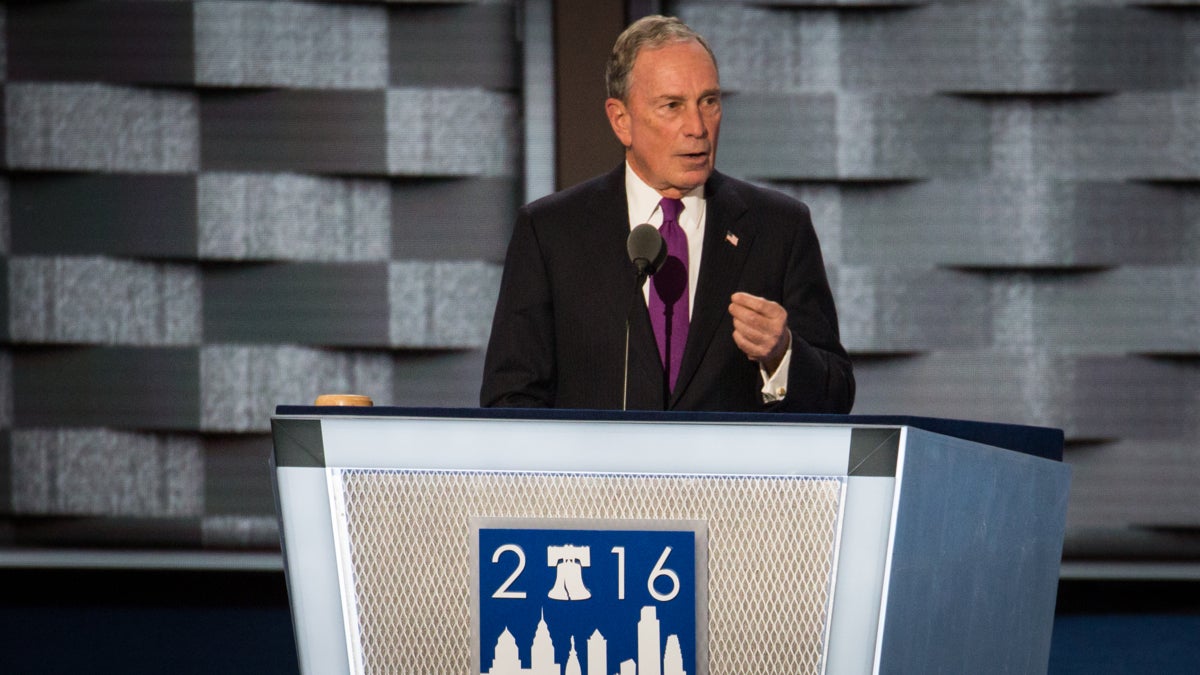Michael Bloomberg’s pithy pitch to the independents

Self-declared Independent Michael Bloomberg addresses the crowd at the 2016 Democratic National Convention. (Emily Cohen for NewsWorks)
While guesting this morning on “Radio Times,” I was pleased when Washington Post reporter Robert Costa contended that the media “under-covered” Michael Bloomberg’s appearance at the Democratic Convention. Because it just so happened that I had this column in the works.
Bloomberg, one of America’s foremost independents (having bailed on both political parties), was squeezed onto the schedule last night amongst all the Democratic heavy hitters. But I’d be remiss if I didn’t hit replay and parse the ex-mayor’s remarks. Because they told us something crucial about the Clinton campaign’s autumn strategy.
In this profoundly polarized era, most voters have sorted themselves into opposing partisan camps. Basically, the winner of a presidential election is the guy (or the woman) who’s most successful in driving those partisans to the polls in the greatest numbers. It’s mostly a turnout game, Team Blue versus Team Red. A lot of people who call themselves “independents” do not actually meet that definition; they tend consistently favor one party or another.
But the pollsters who crunch the numbers nevertheless insist that there are indeed fence-sitters with no loyalty to either side. They dislike politicians in general, and they definitely dislike the 2016 major-party presidential candidates.
This is where Bloomberg came in. He has flirted with so many independent presidential bids, I’ve lost count. (I think the answer is three.) And it’s likely he would’ve stayed neutral this year, had the Republicans chosen a qualified candidate, someone who’d never think of inviting the Russians to commit espionage against America. But the GOP implosion forced his hand. Clinton is surely too liberal for his taste, especially on the role of government, but compared to Donald Trump, she’s ready for Mt. Rushmore.
The Democrats put him on the speaking schedule because they figured he had the juice – as an outsider, as a billionaire businessman – to talk to the true independents. At least half of them, anyway. Democratic pollster Anna Greenberg told me today that “independent men are a disaster for Democrats, they’re mostly conservative. But independent women are a swing group, they are persuadable.”
Bloomberg, last night, pitched his message beyond the convention hall: “When I enter the voting booth, I look at the candidate, not the party label…I know there are many watching at home who (do). And now they are carefully weighing their choices. I understand their dilemma. I know what it’s like to have neither party fully represent my views or my values.”
Speaking for many in the business class who detest Trump, and addressing a sentiment often heard among independents – that they’d love to elect a businessman who’d run America like a business – Bloomberg was pithy: “Trump says he wants to run the nation like he’s run his business. God help us. I’m a New Yorker, and New Yorkers know a con when we see one!”
Many Democrats, starting with Hillary Clinton, have cited Trump’s business disasters – his string of bankruptcies, his thousands of lawsuits, his trail of shareholders who feel cheated and contractors who never got paid and customers who feel ripped off – but Bloomberg arguably had more cred to make that case, because he’s reportedly worth a lot more than Trump and because he launched his biz career without “a million-dollar check from my father.” (In today’s dollars, $6 million.)
Independents want “a problem-solver,” someone with the temperament to take a “pragmatic approach to building consensus” – whereas Trump is “risky and reckless.” Granted, “I understand the appeal of a businessman president, but Trump’s business plan is a disaster in the making.” (Bloomberg didn’t offer details, but here’s a disaster assessment from Fortune magazine.)
All told, “this election is not a choice between a Democrat and a Republican. It’s a choice between who is better to lead our country right now…Join with me – not out of party loyalty, but out of love of country.”
Will his pitch work (assuming he stays involved; assuming his Wednesday night gig wasn’t a one-off)? It certainly can’t hurt. The Clinton team will prioritize maximum Democratic turnout – hoping, of course, to bring Bernie voters fully into the fold – but if this election is as close as it threatens to be, centrists like Bloomberg could be crucial at the finish line.
And I noticed last night and today that Trump hasn’t tweeted about Bloomberg, not even once. I was expecting “Midget Mike,” or perhaps a suggestion that Russia hack him. But he knows darn well that Bloomberg speaks for a rarified club that won’t have him as a member. Sad!
——-
At a forum today, co-sponsored by the website Real Clear Politics, a Republican strategist named Greg Strimple offered his assessment of last night’s climactic Obama-Clinton clench. He said that Obama had a nice smile and came off “like a guy you’d like to have a beer with.” But Clinton didn’t seem likeable at all – because her smile was “crazy.”
Gee. It just looked like a smile to me.
But hey, I don’t live in the hate chamber.
——-
Follow me on Twitter, @dickpolman1, and on Facebook.
WHYY is your source for fact-based, in-depth journalism and information. As a nonprofit organization, we rely on financial support from readers like you. Please give today.

